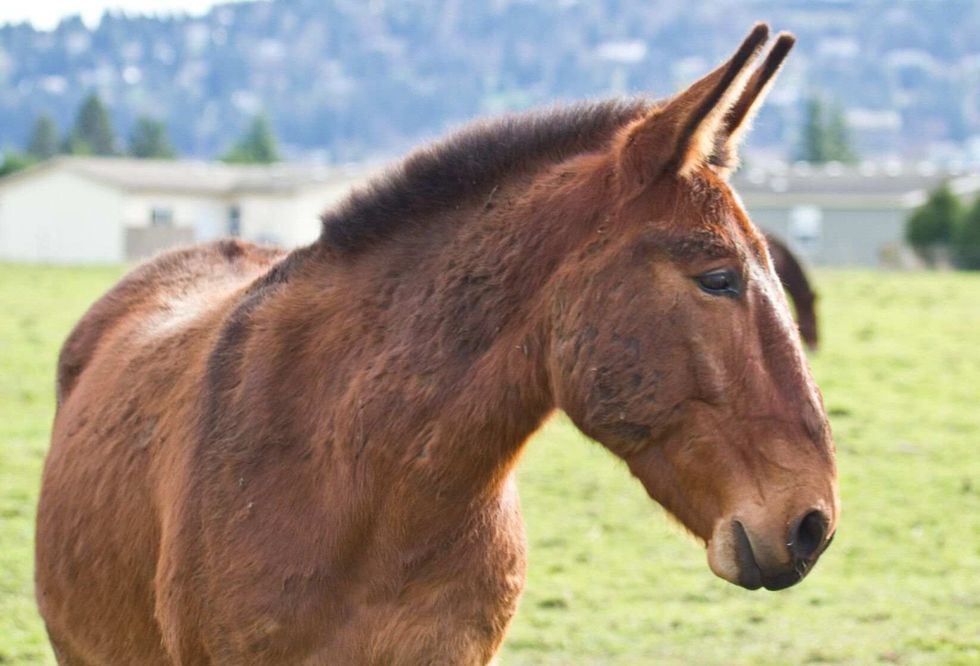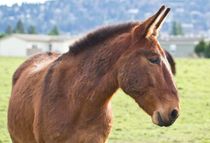Mule Vs Horse: The Key Differences All Equestrians Should Know!

Content
- What is the advantage of a mule over a horse?
- Why do most people ride mules and not horses?
- Which is stronger, a horse or mule?
- Which is smarter: a mule or horse?
- Which is more responsive to their rider, a horse or mule?
- Which is faster: a horse or a mule?
- The Advantages Of Owning A Mule Over A Horse
- Is a mule the right choice for you?
Mule vs horse - which is better, which is stronger, and many essential differences between them all equine lovers should know!
The question is not which is better between a horse and a mule, but which is better for you and what you are doing. It's all about the differences between these two animal species.
Throughout history, riders have been inspired by horses because they are strong, majestic creatures. Mules, on the other hand, are tough little creatures that can carry heavy loads over long distances for their owners; they're also quite intelligent and loyal to their owners. Both of these animals possess unique characteristics that make them suitable for different types of work.
Mules and horses are both pack animals, but they(mules and horses) differ in a multitude of ways. The horse was the first domesticated animal, originated in the grasslands of North Africa and Asia over 5,000 years ago, tamed by humans.
Wild horses' immense size and strength made them perfect candidates for domestication. These animals quickly became an integral part of agriculture and warfare throughout history, and they were also used as pack animals long before they were introduced to warfare.
The mules were created by breeding horses and donkeys, which are equine animals that have been used as working animals for centuries. Typically, the female mule offspring are born from a mating of a male donkey (jack) and a female horse (mare).
A hinny is a name given to an offspring of a female donkey and a male horse.
A hinny (cross of a horse and a female donkey) is a cross more reciprocal to a mule.
Due to their strength, easy training, and ability to pull more weight than horses or ponies alone, mules are more commonly used than horses. Sterile and often used as a beast of burden, mules are the offspring of donkeys and horses (specifically, a male donkey and a female horse).
The equine are both capable enough to carry heavy loads for their owners, but these breeding animals also have distinct characteristics that set them apart and render the ability to carry heavier weights for their owners. Mules are easier to handle than horses, but horses are smarter.
Unlike horses who have their own minds, mules are more cooperative and obedient.
When you begin training horses, it is best to begin young, so as to gain their trust and respect. Because mules are more agreeable, they do not require the same level of training.
To know more about horses, you may also take a look at horse gaits and how to tame a horse.
What is the advantage of a mule over a horse?
Mules are a cross between male donkeys and female horses. A mule can be any combination of the following breeds: jack, jennet, hinny, molly, and donkeys. Mules are sterile so they can't produce offspring on their own.
Mules have long ears(ears longer than that of a donkey), but they are shorter than the long ears of a horse. Mule’s body comes in a variety of colors and sizes similar to those of the body of a horse.
Despite being smaller than horses and more durable than donkeys, these animals can be trained to carry heavier loads and work harder for longer periods of time for their owners. Overfeeding grain to a horse can result in a bout of colic or laminitis.
Even if they are employed regularly, mules do not require grain, and they do not tend to overeat it.
Mules may not contract laminitis or founder, but they are less susceptible to it than horses because of their sensible eating habits. In general, mules do not need high-quality hay as horses do, and mules usually need less hay compared to horses.
When it comes to packing or riding in mountainous terrain, mules are often preferred over riding horses. Since mules are known for their surefootedness, they are known to be better than horses.
Having smaller and more upright feet tends to make him more surefooted than a normal horse. Having a steep drop on one side of the trail will be appreciated if you're traveling on such a trail. Moreover, mules do not panic as readily as horses do if they get into a tight situation.
A mule can be said to have two characteristics. Firstly, they can be very stubborn, and secondly, they can be extremely loyal to their owners, even on a trail.
They are typically stronger than horses, but they also have more endurance than donkeys. A mule is often hardier than both of its parents and can survive in harsher conditions.
Mules tend to be stronger, healthier, and longer-lived than horses. Hybrid vigor, the result of genetic superiority, is present in cross-bred animals with a high genetic level of superiority. Because mules have good self-preservation instincts, they are less likely to sustain injuries.
Why do most people ride mules and not horses?
Mules are believed to live longer, be stronger, and have a body healthier than horses. The strength and endurance of Mules are unmatched. A hybrid's vigor results from genetic superiority. The better characteristics from both parents tend to be passed down to the offspring.
The reason why most people ride mules and not horses is because of size. Mules are smaller than horses, which makes them more comfortable to ride long distances.
In addition, mules are more endurance-efficient than horses. That means they can work for a longer period of time without stopping for a break or water.
As a result of their tough feet and legs, mules have fewer soundness issues, which is great for trail riders. The reason mules are highly preferred for mountain trails is that they are more adapted to the harsh climate and difficult terrain, performing better in rocky areas and on steep incline trails than horses.
Mules have tough skin as compared to the skin of a horse, and can withstand harsh weather conditions. As a result of their self-preservation instinct and tough skin, they avoid any harm.
As a result of their hard hooves under their feet, mules require fewer horseshoe replacements and because of their hooves, they are more suitable for terrain with rocky or watery surfaces. They do not endanger themselves, nor will they endanger you, because they possess a strong self-preservation instinct.
The cost of mules is lower than that of horses. Mules can do some of the work that horses do without requiring as much maintenance, including maintaining their hooves. Mules do not require as much food or fluids as horses do to satisfy their thirst and hunger.
Because mules are more disease-resistant, you won't have to pay as much for veterinary care. Mules are well known for their longevity and endurance.
On average, mules live between 35 and 40 years. Some mules can live up to 50 years. Having a mule and understanding it will give you a better understanding of why so many people have them.
Which is stronger, a horse or mule?
Horses and mules are both strong animals, but mules are physically stronger for their size and have a longer lifespan.
Mules are genetically superior as they are a hybrid between two different animals - the male donkey (jack) and the female horse (mare). Although mules can be male or female, jacks tend to be sterile. Mules are often hardier than their parents. It is more common that the better characteristics of both parents are passed down to their offspring.
Mules have smoother muscles than horses. These enable them to walk on for very far distances without needing much rest.
Whereas, for brief periods of activity, horses have powerful muscles that enable them to run faster than mules. Mules are often used as work animals because they're strong and resistant to diseases that afflict horses. They mature a bit later than horses, but generally are stronger and heavier, and live longer and work longer than horses.
They're also more sure-footed than horses, which makes them useful for mountainous terrain. Horses on the other hand require high maintenance and are not very much resilient to diseases.
Which is smarter: a mule or horse?
You've probably heard the question, "Which is smarter, a horse or a mule?
A horse has a greater level of intelligence than a mule if we take into account memory, learning, and problem-solving abilities. However, if we consider other factors like awareness and self-awareness, the mule stands out against its equine cousin.
A mule is a result of cross-breeding between a mare and a donkey, but a mule is much more intelligent than either.
Mules are smarter than horses in a few ways. In addition to having a longer attention span and a better memory, they are also able to learn to obey human commands more easily than horses. The reason is that mules were bred from horses and donkeys, which are both strong-willed creatures that require thorough training.

Which is more responsive to their rider, a horse or mule?
When it comes to pulling a wagon or plowing fields, the difference between horses and mules is clear. Horses are faster and more agile, but mules can work for longer periods of time without food and water (which means you don't have to stop as often).
But which one is more responsive to the commands of their rider? Horses are faster at responding to a rider's command and have a smoother gait.
When a horse refuses to follow a particular direction on a trail ride, you can coax him along. If a mule does not want to go forward, you may as well turn around.
As mules are considered to be stubborn. A mule is a very gentle animal, and they never attack anyone without a reason, unlike horses, which may attack their masters and may be stubborn as well sometimes.
Which is faster: a horse or a mule?
Consider this: a horse(stallion) is a breed that is excellent at sprinting, while a mule is an excellent marathon runner.
A horse would easily outrun a mule in a 328 ft (100 m) race because their bodies are better suited for it. A mule would be able to cover long distances at a steady pace without much rest as their bodies are designed for it.
The Advantages Of Owning A Mule Over A Horse
Mules came up by crossbreeding horses and donkeys. And thus are genetically superior breeds. Since Ancient Egypt, this breed of animal has been used as a beast of burden.
In agriculture, breeds such as a mule have long served as invaluable work animals, particularly in terrains where no other animals can thrive. In many countries, mules are still used as draft animals.
Draft animals are animals that are used to drag loads or transport grain or coal from far away places. Draft mules are always a better choice as compared to draft horses. There are many similarities between horses and mules.
For thousands of years, both have been used to work on farms, transport supplies, and transport people. Despite being easy to train, they need a lot of food and care.
Due to these reasons, horses and mules are often considered equally valuable for tasks on a farm or in the field. Horses and mules, however, have very different anatomy.
Horses have powerful muscles that enable them to run faster than mules for short bursts of time. The fact that mules are generally easier to keep is one of the reasons why people prefer them to horses.
The mules feed on everything a horse consumes but does so more efficiently. It is possible for a mule to grow taller than both parents depending on what owners feed them.
Mules mature a bit later than horses, but they are heavier, stronger, live longer, and work longer than horses. They also cost less than horses. Mules can perform some of the workhorses without requiring as much maintenance.
Mules require less food and fluids than horses to satisfy their thirst and hunger. The cost of veterinary care will be lower because mules are disease-resistant. They have a reputation for being long-lived and durable. Mules live for an average of 35 to 40 years.
However, some mules may live for up to 50 years. They avoid harm due to their instinct for self-preservation. Mules keep themselves safe, so a rider is also safe riding one.
Is a mule the right choice for you?
Mules are hybrids between horses and donkeys. And thus are genetically superior. Animals like mules are very gentle and never attack anyone without any reason, unlike horses which can attack their masters.
The consumption of food and fluids by mules is less than that of horses. Because mules are disease-resistant, the cost of veterinary care will be lower. Mules are long-lived and durable.
Mules are smaller than horses, so they are more comfortable when riding long distances. In addition, mules are more stamina-efficient than horses. This allows them to work for longer periods of time without taking breaks.
Since they possess a strong instinct for self-preservation, they will not endanger themselves, nor will they endanger you. Mules are an excellent choice for owners seeking a loyal, hard-working animal.
Mules are very intelligent animals that can learn tasks quickly and assist you with tasks on your ranch or farm. Getting a mule would be a good investment. They are friendly, loving, and caring, live a long time, and are eager to work.
Here at Kidadl, we have carefully created lots of interesting family-friendly facts for everyone to enjoy! If you liked our suggestions for mule vs horse then why not take a look at horse eyes or herbivore teeth.
We Want Your Photos!
More for You
See All
Bachelor of Science specializing in Computer Science

Christian MbaBachelor of Science specializing in Computer Science
Christian Mba is an experienced blogger and content writer with over a decade of experience. He holds a Bachelor of Science degree in Computer Science from Nigeria and has a keen interest in Python programming. Along with his writing and blogging expertise, he is also an SEO specialist with more than six years of experience. Chris, as he is commonly known, has a passion for music and enjoys playing the piano.
Disclaimer
1) Kidadl is independent and to make our service free to you the reader we are supported by advertising. We hope you love our recommendations for products and services! What we suggest is selected independently by the Kidadl team. If you purchase using the Buy Now button we may earn a small commission. This does not influence our choices. Prices are correct and items are available at the time the article was published but we cannot guarantee that on the time of reading. Please note that Kidadl is a participant in the Amazon Services LLC Associates Program, an affiliate advertising program designed to provide a means for sites to earn advertising fees by advertising and linking to Amazon. We also link to other websites, but are not responsible for their content.
2) At Kidadl, we strive to recommend the very best activities and events. We will always aim to give you accurate information at the date of publication - however, information does change, so it’s important you do your own research, double-check and make the decision that is right for your family. We recognise that not all activities and ideas are appropriate for all children and families or in all circumstances. Our recommended activities are based on age but these are a guide. We recommend that these ideas are used as inspiration, that ideas are undertaken with appropriate adult supervision, and that each adult uses their own discretion and knowledge of their children to consider the safety and suitability. Kidadl cannot accept liability for the execution of these ideas, and parental supervision is advised at all times, as safety is paramount. Anyone using the information provided by Kidadl does so at their own risk and we can not accept liability if things go wrong.
3) Because we are an educational resource, we have quotes and facts about a range of historical and modern figures. We do not endorse the actions of or rhetoric of all the people included in these collections, but we think they are important for growing minds to learn about under the guidance of parents or guardians.







